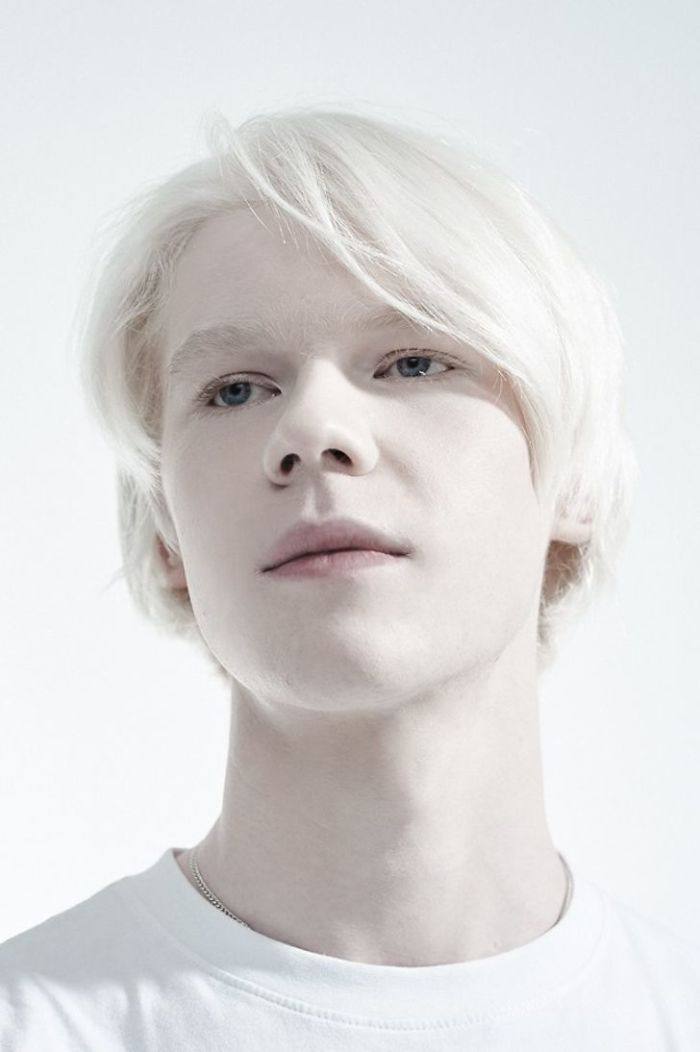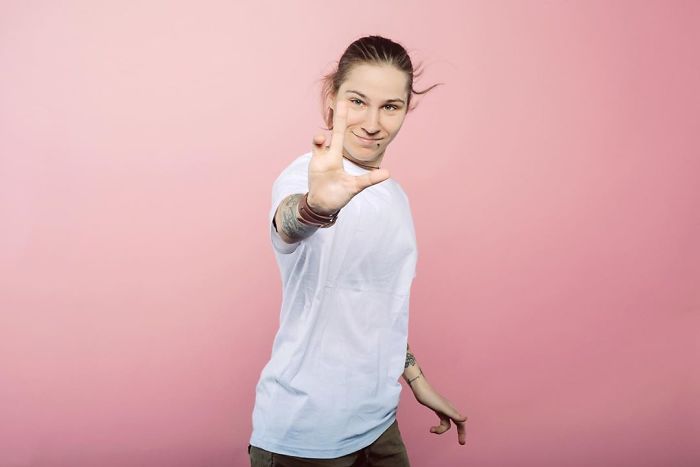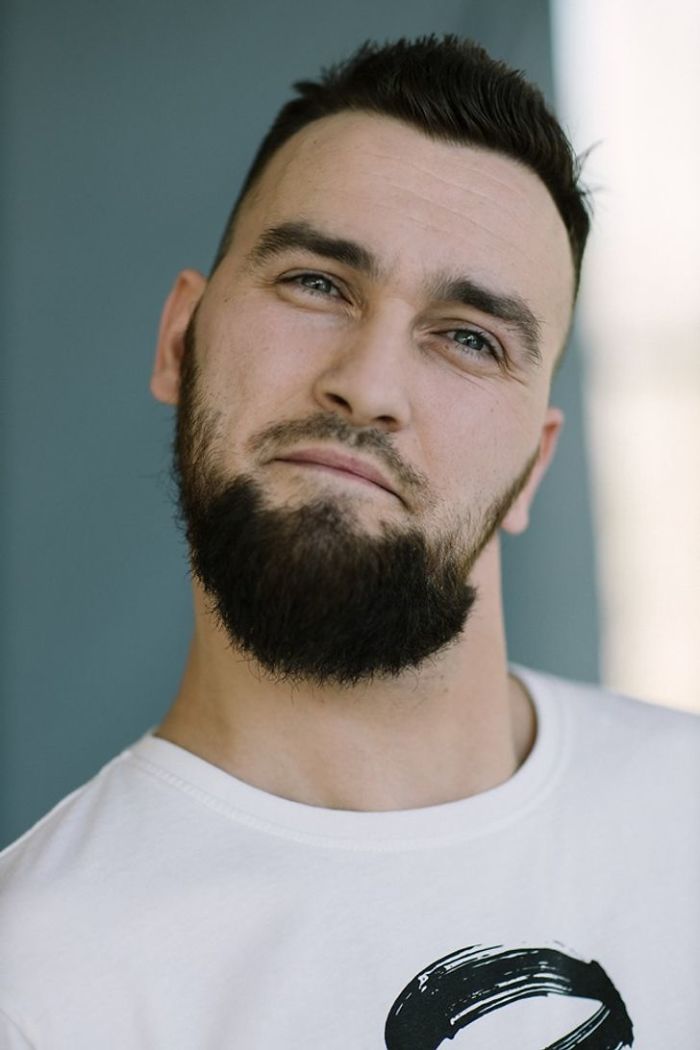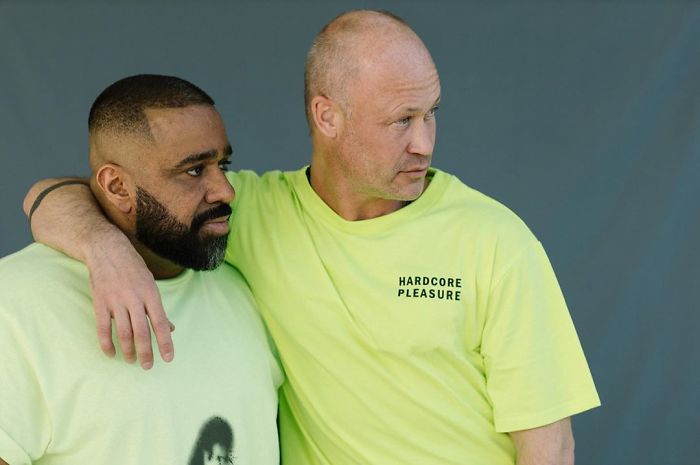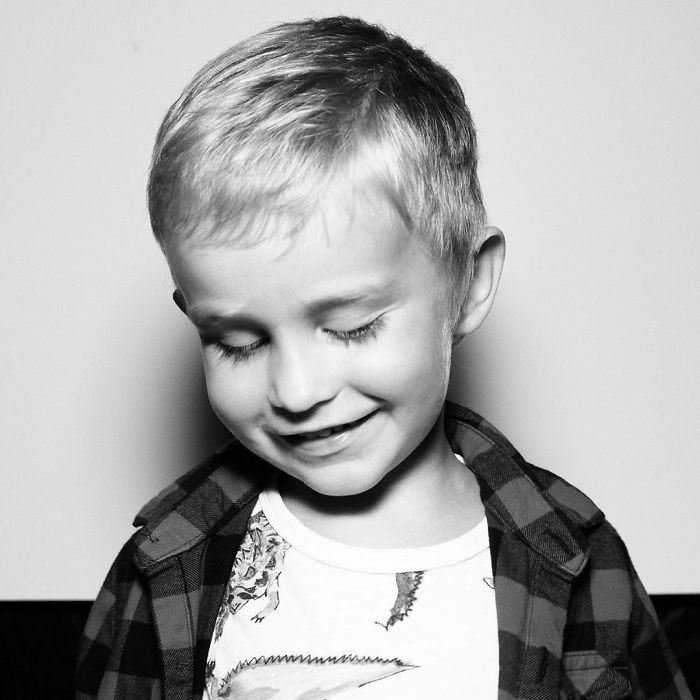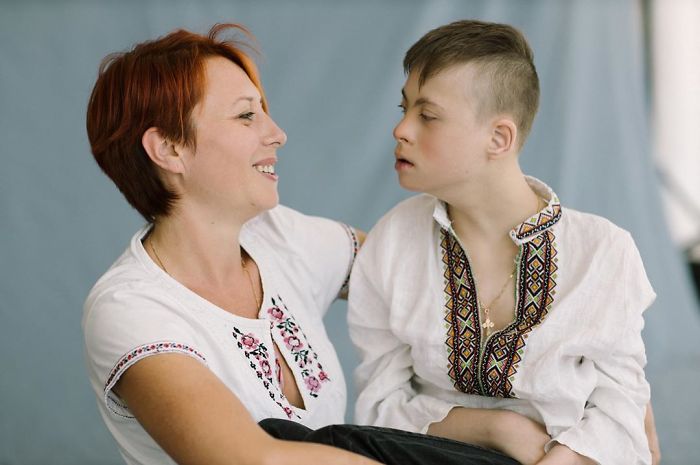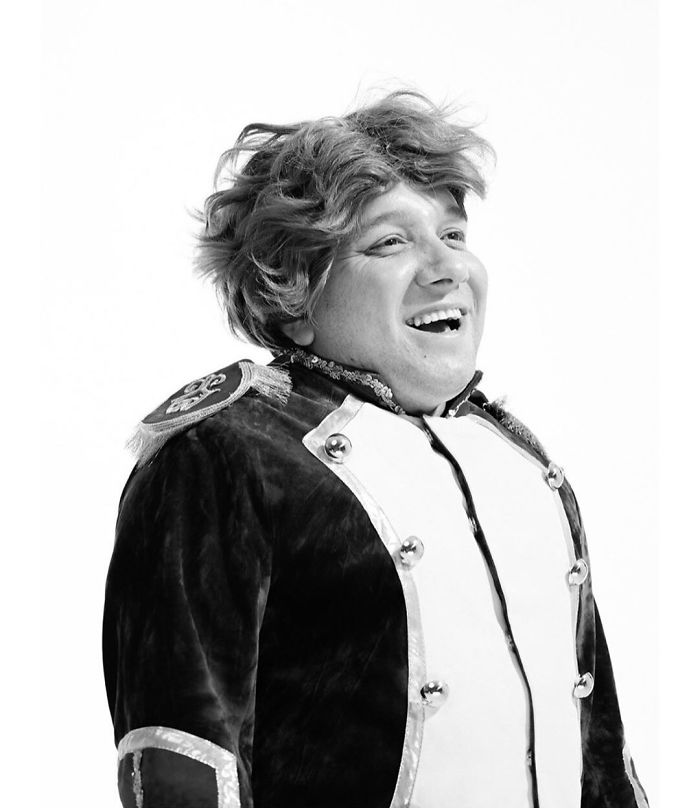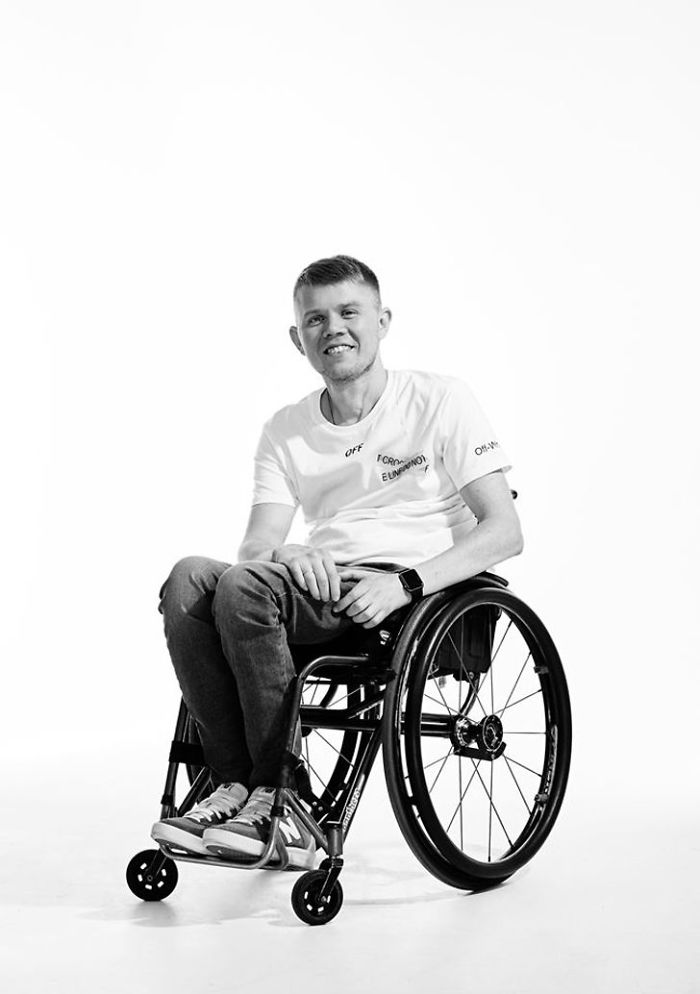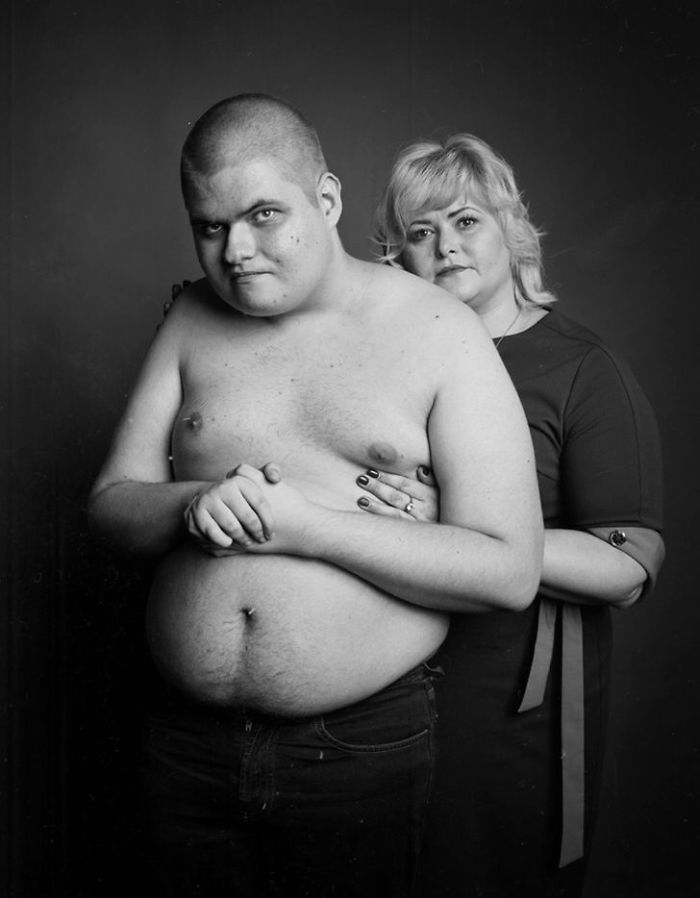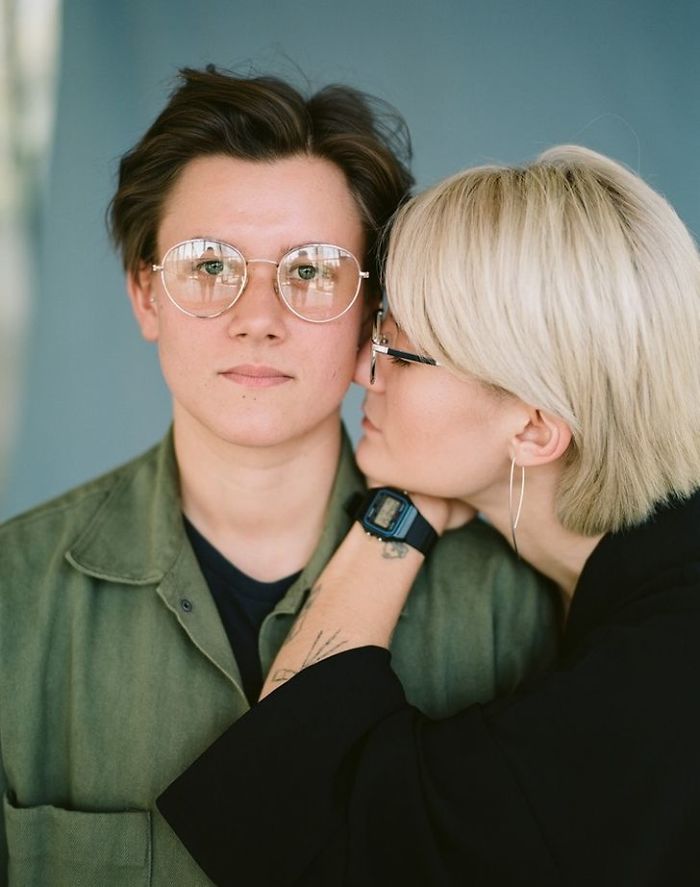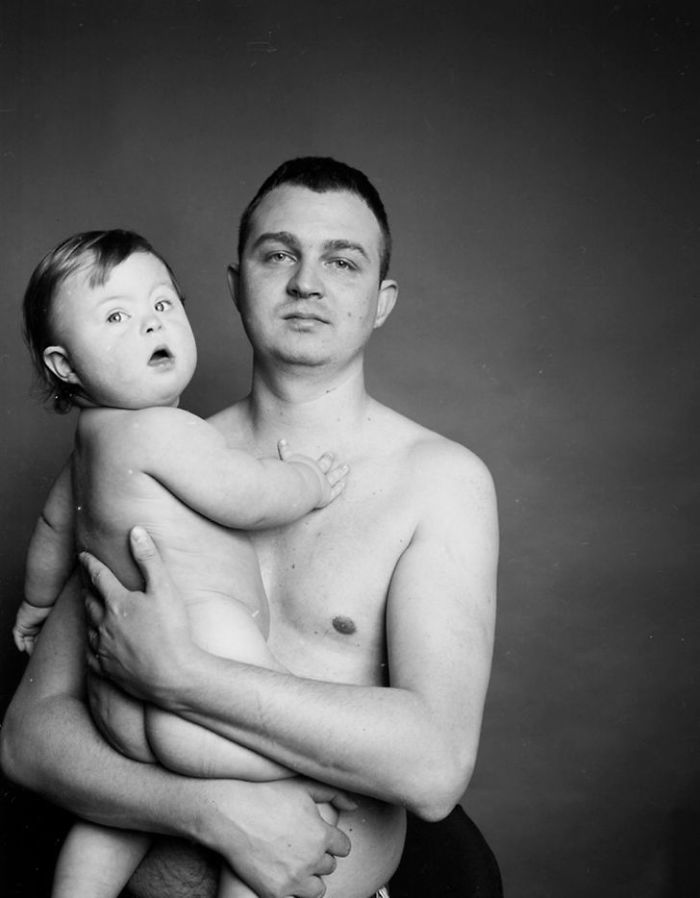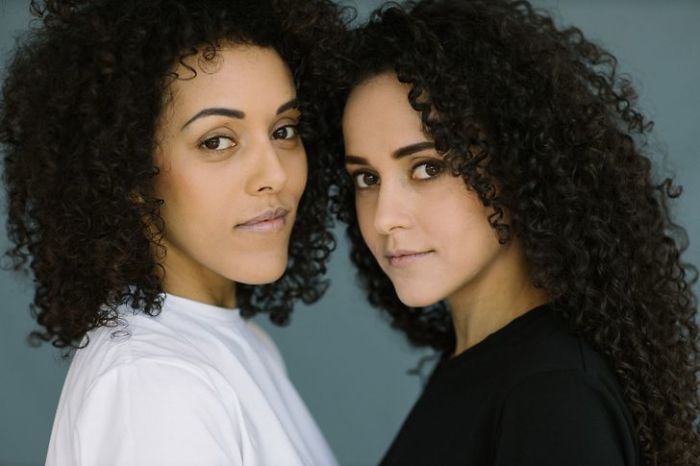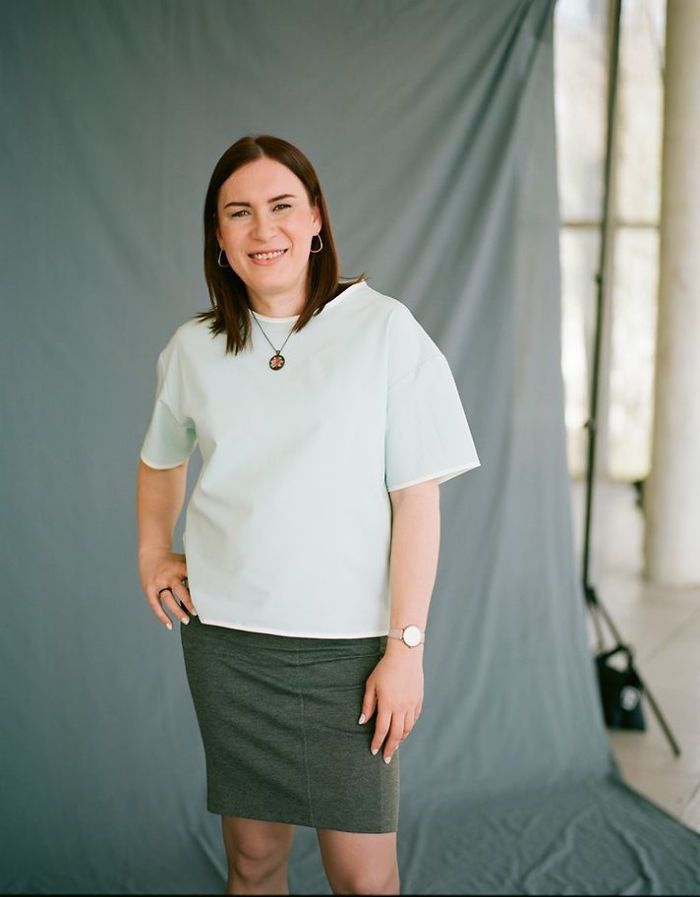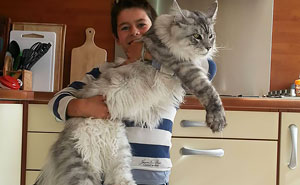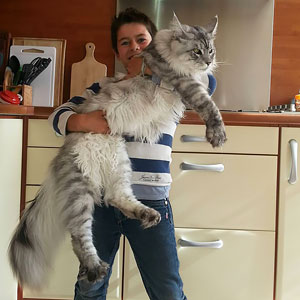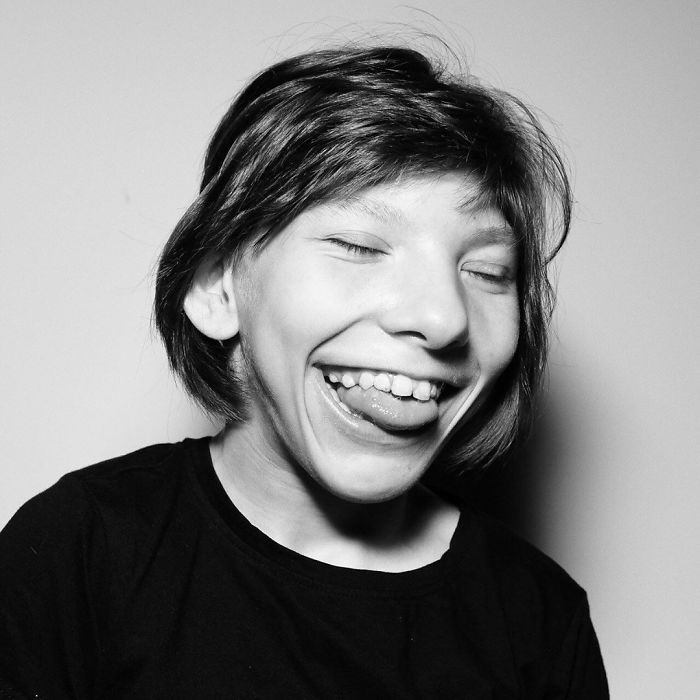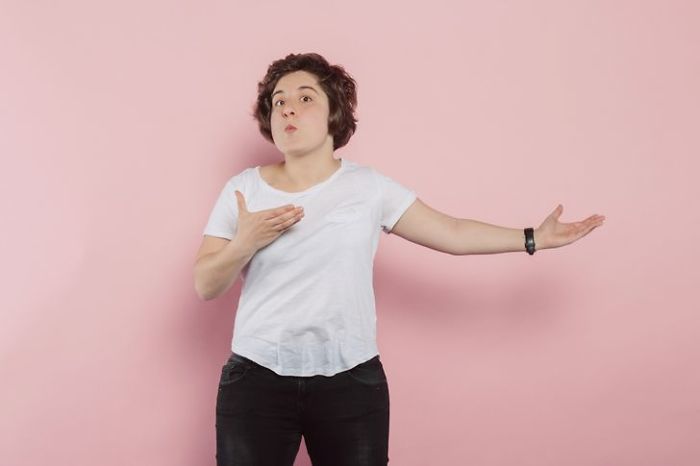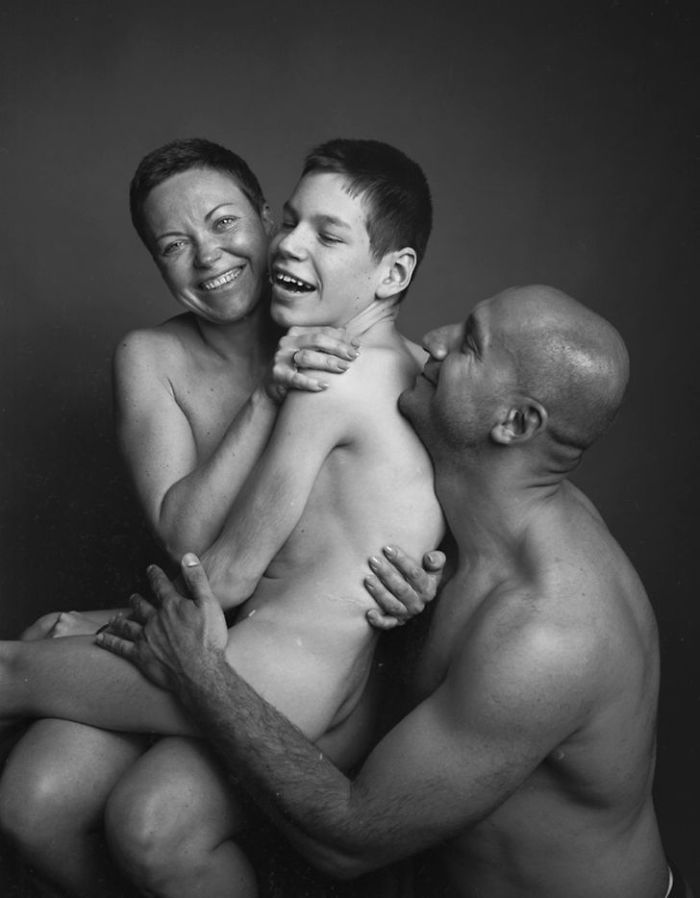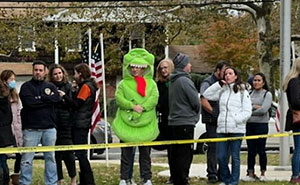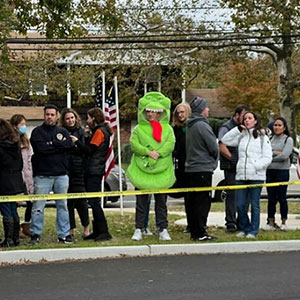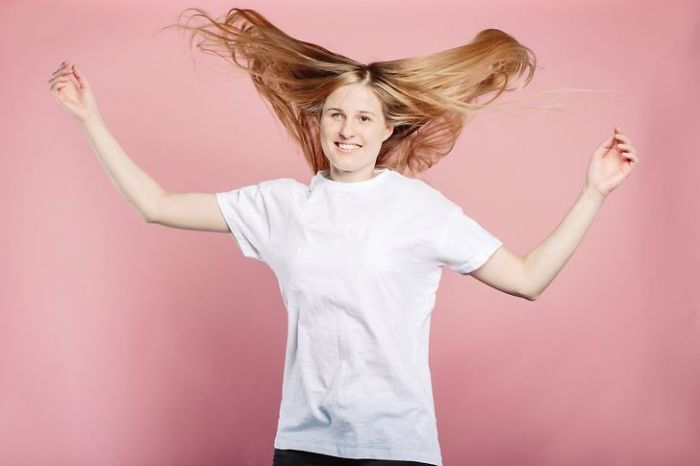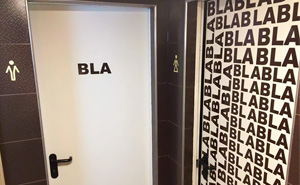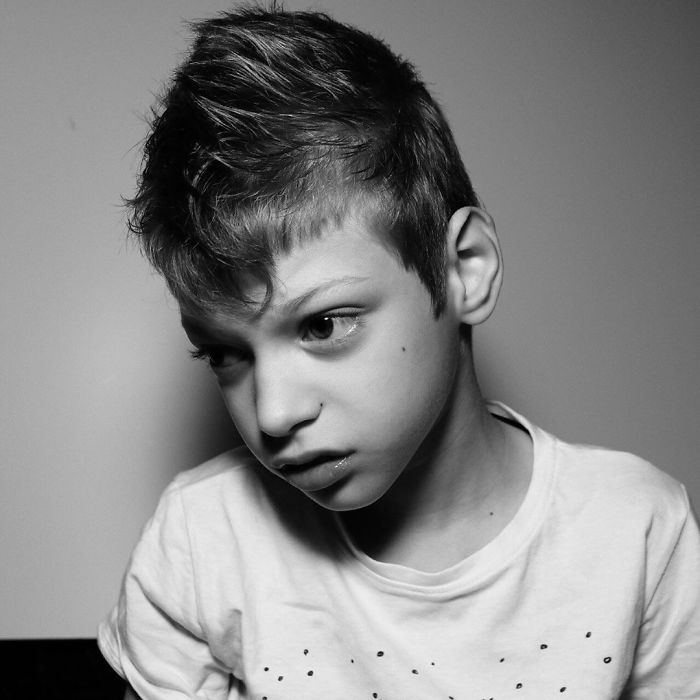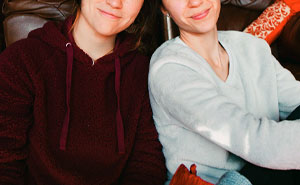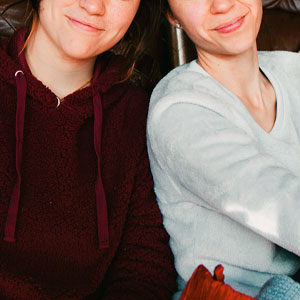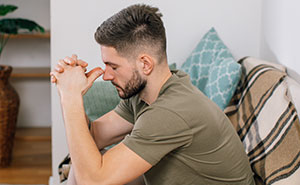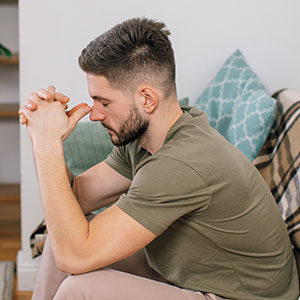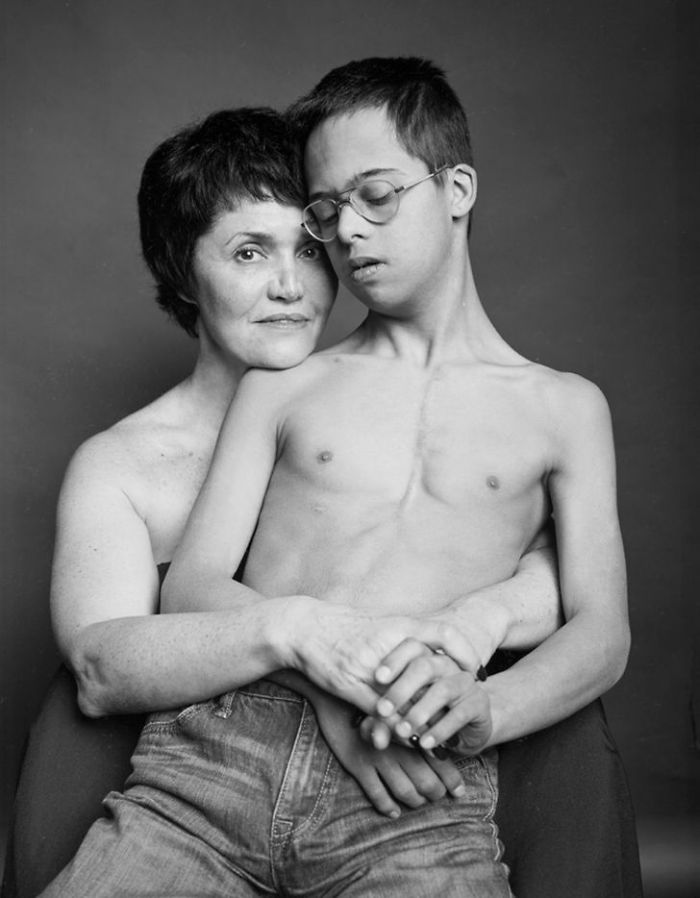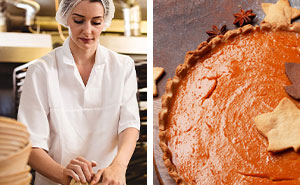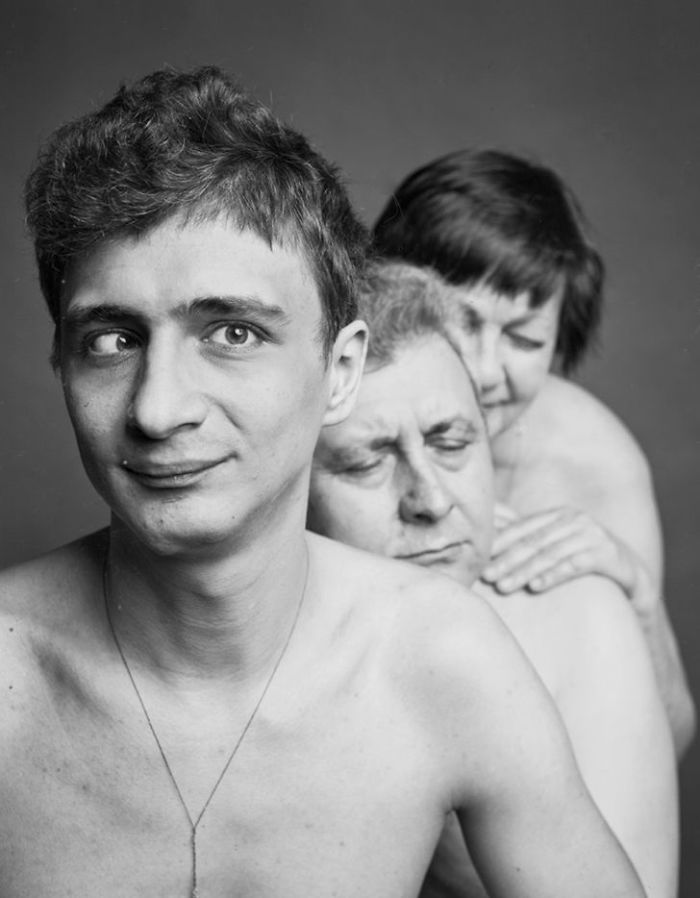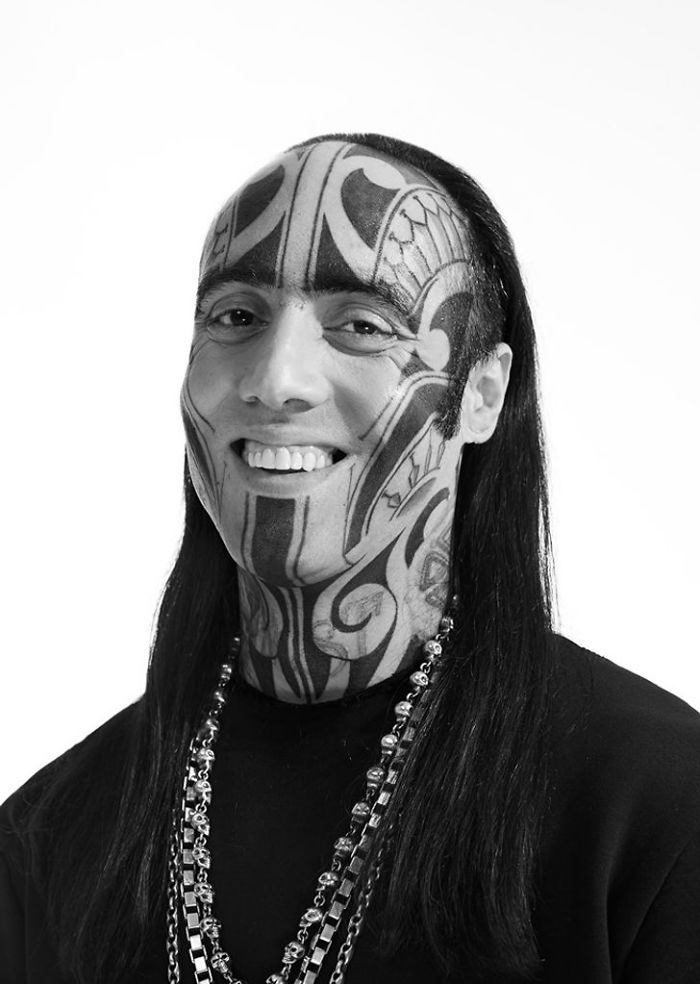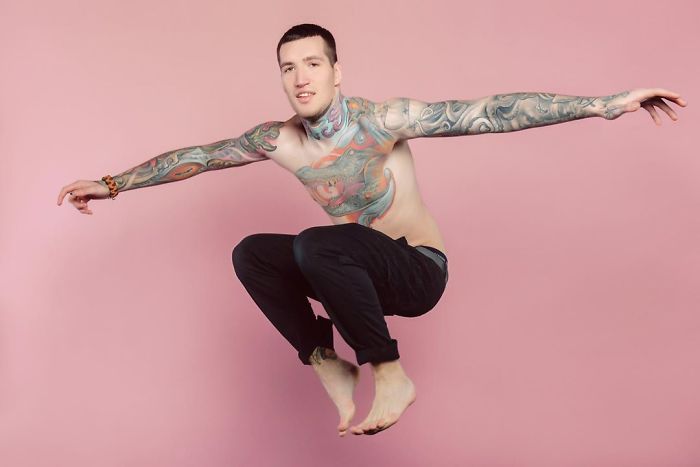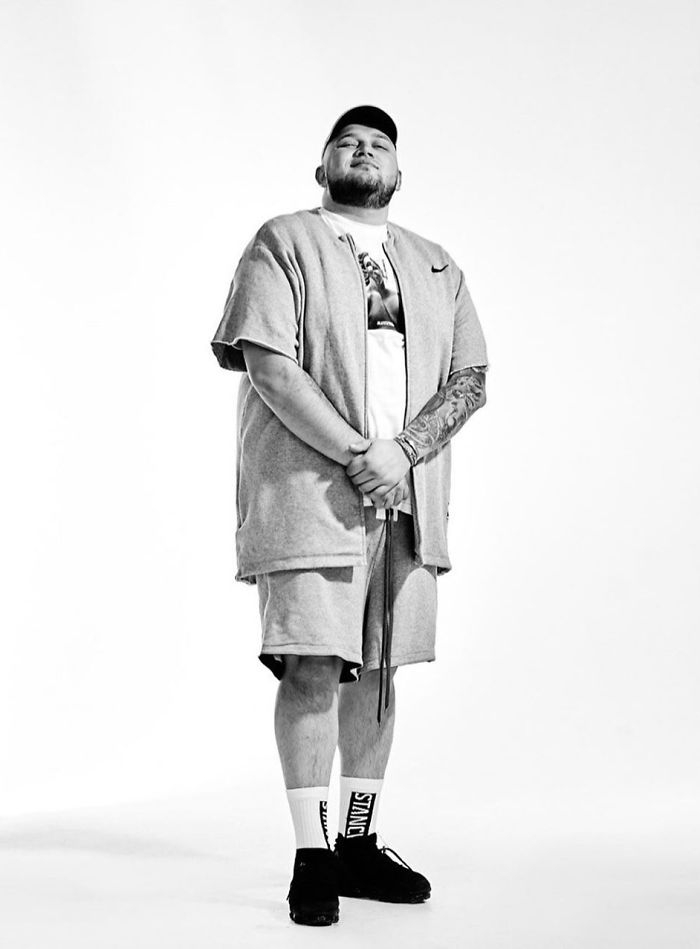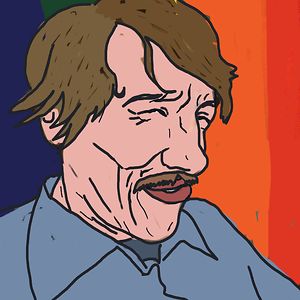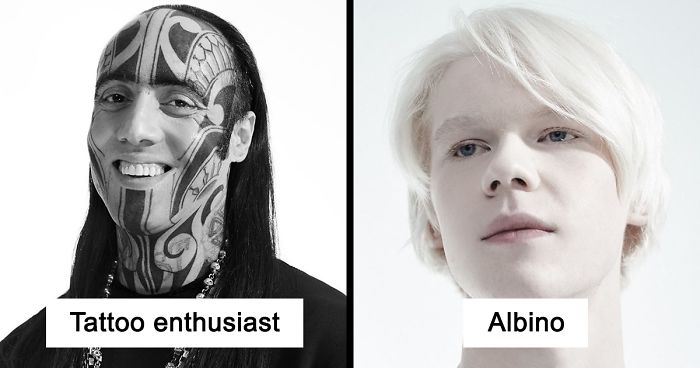
93Kviews
Ukrainian Photo Project Highlights The Discrimination That People Face From Different Walks Of Life (23 Pics)
The five photographers Roman Pashkovsky, Sergey Sarakhanov, Daria Shramko, and Ksenia Kargina, and Taras Vorobets have participated in an incredible project called ‘be anyone, be yourself’, which was organized by Kyiv’s flea market Kurazh. In the project, dozens of brave heroes who suffer prejudice, for being different than ‘normal’ open up about themselves and their struggles. From a girl living with HIV to a man who became a woman, and a family raising a teenager with cerebral palsy. These people are united by a message addressed to everyone, regardless of age, sex, nationality, sexual orientation, and other characteristics. And the message is, whoever you are, it’s ok to be yourself.
More info: Instagram | Instagram
This post may include affiliate links.
Ilya, An Albino
Have you faced discrimination?
Every day for 19 years now, when I go outside without my beanie on, even one person should ask me how I managed to dye my hair so classy. The grannies shout something like: Oh, look at today’s boys—their make-up is even worse than girls. I was bullied at school; I had this stupid nickname kephir. It may sound funny, but still, it hurt me rather strongly. My brother is 9, and now his classmates call him albino. It’s not even an offense, it’s who he is, but he is deeply hurt by it.
What was the outcome of the situation?
Frankly speaking, my appearance always makes a particular impression on people, especially in summer, when everyone is tanned, with dark skin, and I am kind of illuminated. I’ve never told my parents that I was bullied, so they didn’t explain my peculiarity. When I received the access to the internet, I started searching for the stories of others like me, subscribing to albinos’ channels, I accepted myself, and now I am a star of every party or event. I receive a tremendous amount of attention, and I like it.
What do you like about yourself the most?
Now I accept myself and feel love for myself. I didn’t earlier, but now I do like myself as I am.
Lina, Has One Leg And Three Fingers On Each Hand
What kind of discrimination have you faced?
I have one leg and three fingers on each hand. I was just on the bus when some people came up to me and asked: “Why don’t you give up your seat?” I replied that I was disabled; it was hard for me to stand now. I had already traveled through half of the city. Someone shouted: “Yes, she is disabled. Why are you touching her?” “It would be better if the disabled were sitting at home!” Better to stand than hear it. But that doesn’t happen often. People are trying.
What did this situation give you?
When all the time you are fighting for equal rights, especially when you leave the boarding school, and you also have a bonus—you are an orphan, you have nothing, but you are always fighting for something and fighting for something. And then you think: “Why are you fighting all the time? Live your life; enjoy it.”
What do you love about yourself?
I am proud to be like this. Show me more people who have three fingers!
Rostislav, Cerebral Palsy
What kind of discrimination have you faced?
When I was finishing university, I thought that I would build my career in the banking sphere. But I wasn’t even regarded for the job interview if I showed my diagnosis. Then I stopped doing it, and I got asked for a job interview more often, but still, I was rejected on the spot. Or sometimes, they were talking to me even though it was clear that I have been removed from the candidate list already. Eventually, I became the SMM specialist to work remotely and not explain anything to anybody. But still, sometimes clients that see me in real life wonder, saying oh, from your FB, we couldn’t have presumed that you have cerebral palsy.
What was the outcome of that situation?
Maybe if it hadn’t been for my diagnosis, I wouldn’t be so eager to achieve something. I would live like everybody else. But I am confidently trying to meet all my goals; I don’t give up because I won’t have another chance. For example, I want to buy a dog for my daughter, but I need a house for it, and for the home, I need money. But I believe that I will succeed.
What do you like about yourself?
I am very judgmental toward myself. I work a lot, earning for my family, which I adore, I can make my wife and my daughter laugh, I have friends with whom I can play football and basketball.
Yashar And Myhailo, Gay Couple
What kind of discrimination have you faced?
Yashar: 18 years ago, I left home when I understood that I’m gay. In the East, where I am from, gays are hanged according to local legislation. Just in the yard of their parents for them to see this disgrace and live with it. When I was about 8-9 years old, I saw such situations, and I was very afraid that some of my relatives might figure out that I like boys. When they figured it out, I left my home, and we haven’t seen each other since then. I was 18.
What was the outcome of that situation?
Myhailo: Support. My family loves Yashar a lot, and they take his side constantly. I guess their faith in us as a family is the secret of such a long and strong relationship.
What do you love about yourself and in each other?
We are handsome, fair, and happy.
Those who preach loudest against others are the ones who fear most of recognizing that other in themselves.
Timur, 4 Years Old. Mother Christina, 27 Years Old. Diagnosis: Blindness
Have you ever faced any discrimination?
Now it is bypassing us because he is still small.
Sometimes there are merely silly questions. Recently, I was standing at the airport, holding Timur in my arms. Someone behind started asking: “Are you going to take your baby to see a doctor? He has strabismus.” But this is small stuff; I don’t even pay attention to anything like that.
Children often wonder why Timur uses a walking stick. But this is a normal question and we can answer it.
What did you learn from this situation?
Appreciate, enjoy success, no matter how small.
Other parents can be annoyed by such things as playing or running children. But for me, it’s all a game.
Timur taught me what real patience means. And also, I’m learning to catch the rhythm of life to adjust to Timur.
What do you love about Timur the most?
I love it when he has joy when he laughs. His laughter is a blessing. I love it when he hugs me hard or says in the morning: “Mom, Dad, lie down with me a little more.” That’s my happiness.
What a beautiful little boy. I also have a 4 yo son and I live for extra hugs from him!
Mother Tatiana And Son Vladimir, 14 Years Old, Down Syndrome, Tetraparesis, Epilepsy
What kind of discrimination have you faced?
There were situations when trolleybuses shut their doors right in front of our noses—that wasn’t very nice. But if people stare at us—so be it. I tell other children about Volodia. I explain to them why he can’t walk because their parents don’t explain it to them.
What were the lessons in that situation?
For a long time, I was sure that I could deal with everything myself. It’s my child, my fate, my story. Some people wanted to help, but I shunned from them. Volodia taught me to accept help. Before heart surgery, when Vova was four months old, a woman in the hospital approached me and told me this child would show you the world. I thought then where can I go with him?! But later, I understood that she meant another world. He showed me something that I would miss without him.
What do you like about this situation?
In this situation, people are what I like the most. They are different, and there are a lot of kind ones. When you are continually moving around the town, you learn to appreciate it. In one trolleybus, someone closes the door behind you; on the other, somebody gives you an apple. Or just approaches you and says, I wish you luck. And you are just standing there, smiling. Just because something like this happened.
Eugene, A Little Person
Have you faced discrimination?
My height is 107 cm. People always react to me really awkwardly. When I was trying to enter the university, I was rejected. I couldn’t work anywhere, either. I was constantly bullied, so I felt terrible. I started to abuse alcohol and drugs. I spiraled down till I received a suspended sentence and got expelled from the university. Then my relatives started feeding me pills, coded me to change my life, but nothing helped. I had really low self-esteem.
How did those events change you?
I was saved by faith. I started going to church, and there, listening to the stories of other people and reading the Bible, I understood that nobody’s to blame that I am who I am—it’s not a mistake and not an illness. It just had to be the way it is. I accepted myself, and it turned out that I could realize my ambitions and be unique in a certain sphere. Now I work as an actor. 2 years ago I set a record becoming the smallest actor in Ukraine.
What do you like about yourself the most?
Now my favorite thing is my height. It makes me unique and provides me with the possibilities to achieve whatever I want to.
Vitaly
Have you faced discrimination?
The thing that upsets me the most is the discrimination from the state. According to the law, which hasn’t changed since 1975, a person with a trauma similar to mine can’t drive, even though people worldwide can. The world has moved on; many appliances can substitute the fingers that don’t function properly. They provide the possibility to drive safely. I have been demanding the permit for access to the driving test for three years already, but it’s impossible in accordance with the law.
What was the outcome of such experience?
When you face the hardships every day, you understand that you have to solve them and help others to solve them. My disability was the catalyst of inner changes, facilitated the social activities, and taught the law. Now we can help other people that follow the same path as we do. And thanks to the center of active rehabilitation for people with disabilities, we found each other.
What do you like about yourself the most now?
My favorite feature about me is my persistence. I am glad that I don’t stay aside, and thanks to my disability, I learn to act decisively.
Mom Tatiana And Son Ivan, 21 Years Old, Autism
What kind of discrimination have you faced?
For people like Vania, discrimination is everywhere—from doctors to teachers. We had to make a lot of effort at school for Vania to continue studying. Each year, he had to pass the panel which decides whether a child can study in the next grade. After the first panel, Vania went bald because of anxiety. No one paid attention to his individual needs: he had to wait for his turn for a long time, and I wasn’t allowed to accompany him to the room. He couldn’t cry in tears, so afterward, it was his hair that fell out. I wrote complaints, but we had to move to another city and then recuperate for three months.
Not so long ago, Vania fell ill. He had a fever, so we went to the clinic, went through examination, and, as a result, were sent to Pavlivska hospital. They said: You should go there. I reminded the doctors that the point was that he had a fever. They told me that when it comes to such people as Vania, the primary illness should be treated first, and that we should stop thinking about the fever. They didn’t refuse to help us, but eventually, they didn’t help at all.
What was the outcome of that situation?
Once I said that I would never leave my little town, but as soon as I understood that no one was going to help me, I decided to move to the capital to help Vania and come back. But it turned out that it wasn’t me who was saving Vania; it was him who was leading me. I liked it in Kyiv. I changed my occupation. If we hadn’t moved at that time, our older son’s fate might have turned out differently. He has more opportunities in Kyiv. Each person has to endure some hardships. I am thankful for who I am and where I am today. Now I am a director of the social rehabilitation center and psychotherapist, while earlier, I was an accountant.
What do you love about Ivan the most?
Vania is very kind. He has an unlimited amount of warmth, and he is also very neat. This quality is one of the symptoms of his illness, but it’s positive.
(I can't edit posts) Being aspergic every day is difficult for me, however being diagnosed as full autism must be very challenging, therefore my heart goes out for people that are living with this). Sorry, I don’t know how to use the right words, but when I think I’m having it bad (which, is most days, well pretty much every day) I f*****g feel for the people that are struggling with full autism. Actually not every day is bad, but then it's probably because of medication.
Ira And Nastya, Lesbian Couple
Have you ever faced discrimination?
Nastia: The major part of discrimination was from my parents. Once they got to know about Ira, it was very hard for them to accept it. There were attempts to talk to them, but they didn’t want to hear and accept. They said that we might continue communicating if I pretend that Ira’s not there. So we haven’t been talking for four years.
We want children, but in Ukraine, you can’t adopt marriage, and in order to do IVF, you have to prove that you can’t have a child physically.
It is important for us to make our relationship legal, not just to celebrate a wedding and have the rights like all others do. It’s necessary for everyday situations. According to legislation, we are nobody to each other. If something bad happens, we won’t even be able to get into the emergency room. So it is very important that civil partnership becomes legal in Ukraine.
What was the outcome of that situation?
Support in each other and shared dreams. We dream that once we grow old, we will be together treading grapes on Sicily, riding an old convertible smoking a joint, and taking our adopted child to school.
What do you like about yourself and your partner?
The ability to perceive life simply and openly without prejudice and stuff.
Dad Roman And Baby Solomon, 1 Year Old, Down Syndrome
Have you ever faced discrimination?
Mom Dasha: Actually, I was more afraid of myself due to stereotypes. I was worried that we wouldn’t be able to play on playgrounds. I was worried that somebody might have a look and see that I have a child with DS. I was afraid that he would not develop. It was hard. But the time has passed; I watched him grow and learn and realized that I shouldn’t be afraid.
What was the outcome of that situation?
I became more open. I try to fight the stereotypes, talk about my son’s illness as much as possible. I want children with DS to go outside. I want adults to change their attitudes towards such children. I want mothers of such children not to be afraid of anything. I lead a blog, talk to those hiding their children with DS as far away as possible in villages with grannies. I try to state that this illness is not a sentence. Because there is a person and this person doesn’t need labels, they need love.
What do you like about this situation?
I think that Solomon will be a very strong boy. He won’t have a chance to give up. Thanks to his illness, he always has to prove a point, and it will make him successful.
Every person I have met with Down's Syndrome has proved to be very loving and kind. Keep your head up. Don't let anyone belittle your lovely son. And I am sure he will find success in his life.
Lada And Yuna
Have you ever faced discrimination?
Unfamiliar and unknown is always scaring people. So since the moment of the wedding, our family has undergone humiliation, moral abuse, and discrimination. Mom always tried to save us from rudeness, sought to nurture our confidence and faith in our beauty, uniqueness, and originality. Thanks to her wisdom, we almost didn’t get offended by things we heard about ourselves. We were called monkeys, n*****s or wogs along with the singing of the song “Ha-ya-ya-ya they killed a n***a.” Mom recalls that we were applying cream on our whole body, believing that it will help our skin become white.
What was the outcome of that situation?
Discrimination taught us to defend ourselves, to fight for our rights and be kinder to other people.
What do you like about yourself and each other?
A lot of people are surprised by our sisterly love and strong friendship. We really appreciate each other and try to keep each other safe. Each of us is 100% sure when it comes to her sister. We are each other’s constant support.
Nastya, A Transgender Woman
What kind of discrimination have you faced?
I am a transgender woman. Once I started the transitioning (hormonal therapy), but still didn’t have new documents, I was always facing problems. I was stopped at the airports; I had to prove that I am me. I had to tell my story to everybody.
When I was severely beaten in a nightclub, this case wasn’t even investigated. The police came, saw me, laughed at me and closed the case. When you have a masculine name, patronymic name, and surname at hospitals, but you look like a woman, the doctors start to discuss it out loud for the whole queue to hear.
When you go to the hospital, but you don’t have proper documents, and you look temporarily not like you in your passport, you are defined as your gender in the papers. I mean, even though I look like a woman, I had to go to a man’s ward. These situations usually provoke conflicts. They can’t escape transphobic thoughts and violence.
What was the outcome of that situation?
Finally, I aspire to something. Before I became a full-time woman, I had no particular goals. I felt that I had to live my whole life playing the social role of a man—I have a wife and a daughter. But during the last three years, I started to see that there’s light at the end of the tunnel.
What do you like about yourself the most?
After the beginning of the transition, I like my determination and persistence. I am happy that I can accomplish everything.
I can relate to this a lot. I am also transgender (female to male) and society can be much crueler than you think. I've had doctors refuse to call me by my preferred name, even after I"ve reminded them. I've had people call me slurs at school. Still, I am determined, much like Nastya. There are good things in the world for me, and for her. I'm just hoping the rest of the world will realize we aren't as "weird" or "unnatural" as they make us out to be.
Polina, 14 Years Old. Mother Natalia, 44 Years Old. Diagnosis: Congenital Malformations Of The Brain, Spastic Tetraparesis, Secondary Microcephaly, Partial Atrophy Of The Optic Disc, Epilepsy
Have you ever faced any discrimination?
There were two accidents when we felt uncomfortable.
The first was when I was giving birth to Polina. Doctors (I guess from the best wishes) were saying: “Give her up, you’ll give birth in the future to healthier ones.” Strangely enough, in the place where you need to be supported, they say terrible things.
The second happened to us in the Pochaiv monastery. The priests looked at each other and said to us without hesitation: “Ah, you must have smoked, drunk hard, and gotten abortions. Why have you now come here to pray with your bastard?”
I usually stay calm to this, or just screw it immediately and am no longer upset about it.
After Polina’s birth, all of our mates and friends who thought it was time to screen out—they’ve screened out. If talking about strangers—we always come across understanding people. On the train, people yield lower seats for us, in shops, they open doors. I think a lot depends on how you behave. Sometimes I just make a poker face with the thought “I’m fine” and move on.
What did you learn from this situation?
We’ve changed everything. It was a conscious pregnancy when I was 30. At first, we were working hard to ensure that we had everything: an apartment, a car, that we had time to do everything in our plan. And just then planned to have a baby.
We’ve also changed our attitude towards other people and especially children with disabilities. I am ashamed to admit—before pregnancy, I did not see children on the streets in wheelchairs. Maybe I just didn’t pay any attention.
What’s most important—you start to appreciate everything differently. Many things just don’t matter, and vice versa.
What do you love about Polina the most?
She’s a fighter. She may cry for a long time because of a headache or stomach ache. But in the end, she always starts to smile, even though she might be in pain.
Yana, A Person Living With Hiv
What kind of discrimination have you faced?
I live with HIV since birth. I won’t call it a peculiarity—it’s a normal part of my life.
When my classmate’s granny figured out about my diagnosis, she phoned my mom and asked: "Why didn’t you tell us about it?" Then the whole school knew, and children eyed me in distrust. But I didn’t feel it, because if you are ready for anything, for anything that may happen to you, you just don’t pay attention to discrimination.
My mom was using drugs, and when she was pregnant, she continued. So one more fact about me—I had a heroin addiction, and when I was born, I suffered from withdrawal syndrome and was sent to an orphanage for three years. At that time, my mom was still using, but then she tried to stop. Once she managed to stop, she took me from the orphanage and we’ve been living at granny’s on the Left Bank.
What was the outcome of the situation?
“OK, HIV, so be it.” I take pills regularly, I live normally, and my diagnosis is the least of my problems. If you perceive it in such a way, you won’t take what others say seriously. The discrimination may continue, but you don’t care—you have much harsher experience already.
I am 21 years old. When you are ten years old and you know that you have HIV, you understand that people surrounding you, guys from your school, teachers, etc., everybody talks about AIDS, not HIV. Everybody’s interested not in what HIV is, but what AIDS is, and everybody understands that everybody dies.
My granny still can’t forgive me for telling everybody about HIV. She says: “You think you are a heroine?” In the end, she was the one to be discriminated against. Not me.
What do you like about this situation?
HIV is a remarkable case, the marker of everything. Even friends who knew everything told me "I am afraid of you," and it’s okay, because people just don’t know. They might not be your type of person, and HIV is the best possible litmus test and self-defense.
Mom Tanya, Dad Sasha And Rinat, 14 Years Old, Cerebral Palsy, Dysarthria
What kind of discrimination have you faced?
Every day we encounter inconveniences and lack of accessibility—steps are everywhere. If you remember from the very beginning, no one told us anything. They just put me in the hospital right from birth and quietly let me go home without comment. When we started looking for a family doctor, no one wanted to be ours, and no one said anything either. Cerebral palsy was diagnosed after a year. However, it was a birth injury.
It often happens that we are walking down the street and someone across the street shouts: “Wow, look, a grown guy in a wheelchair!” But we are not offended by this.
What did this situation give you?
I have become tougher because there is no other way out. Strangers often crawl into our space, trying to give advice. They come up on the street, ask to write down the number of some shaman for us, say that he will fix everything. I had to learn how to answer them all.
What do you love about this situation?
The realization that you can accept everything in life and live peacefully with it further. There is no need to strain and renounce everything; you can just accept and learn to be happy, no matter what.
Masha
Have you faced discrimination?
When I was two years old, I received an eye injury. I can’t see out of it. I was playing in a play pit, fell onto something plastic, and was injured. I had two surgeries, and the vision can’t be restored. My whole life, I have been living like this—I can see with my left eye only. I faced discrimination at school. There were a lot of offensive words, nicknames, etc. It lasted for several years. You are just wandering the school like a leper who lost his bell. When I was in the 8th or 9th grade, I understood that I could be like everybody else. I received signs of attention from boys; they tell you that no, you are very beautiful. I had another depressive episode when I was in camp, but the boys told me: I have big ears. So what? Should I just sit there and cry over my miserable life? Later, I understood that once you have your friends who love you, they don’t care about your peculiarities; they just don’t see them.
What were the lessons of the situation?
People you don’t know and who see you for the first time are staring; children are staring and asking their parents: Mom, look! And you are just standing there, smiling, and showing that everything’s okay and the world is wonderful.
I’ve learned to accept myself. It’s hard because when you don’t look in the mirror, you consider yourself normal. I have hands, legs, a nose, and a head. I’m a beautiful and pertinent girl. But once you look in the mirror or look through your photographs, this feeling stays and probably will never fade away. You accept it and you live with it. But you can’t accept it fully. The issue of acceptance is constant work. This only important thing is acceptance from my child.
What do you like about yourself the most?
The attitude of my daughter. I was very worried that when I gave birth to her, she would be worried that her mom is not like every other mom. I was worried about how I would look her in the eye. This issue vanished when she was born. Nothing changed in my life for worse. And now she has grown up and she tells me: Mom, you have the sea in your eyes. You are so beautiful, and it only makes you more magnificent.
Danilo, 9 Years Old. Mother Natalia, 38 Years Old. Diagnosis: Cerebral Palsy, Epilepsy, Partial Atrophy Of The Optic Nerve
Have you ever faced any discrimination?
The doctors at the maternity hospital immediately told me that Danya would be my burden for life.
When Danilo was three years old, we went to the supermarket with him. As he does not see, he is very responsive to sounds. That’s why he can suddenly exclaim something from over-excitement. That time, he shouted. It wasn’t so loud, but the woman looked at us very strangely. She observed that I had such an ill-mannered child, and she later asked whether he was sick. That time, it came as a surprise to me, so I didn’t know how to respond. There were people around, and everyone looked sympathetically.
After this accident, I didn’t go to shops and cafes with Danilo for like a month. In my head, I was constantly scrolling through that situation and asking myself, what I should have answered. Unfortunately, all parents who are raising a child with a disability will face this situation once.
Now I also face discrimination. Danilo is big and uses a special wheelchair.
Children on the street ask their parents why that is. And many times, they don’t even have an answer. This is bad because the question remains and will sometimes arise again. If everything is explained to a kid, he will feel pity and maybe want to come and help.
What did you learn from this situation?
You need to be happy about the moment and not think about the future. I’ve learned to live in the moment and appreciate the present. He smiles and I’m fine, I don’t need anything else.
What do you love about Danilo the most?
I love it when he wakes up in the morning, feels if I’m around, starts smiling and sending me kisses. This moment of awakening is very intimate and very much ours. It belongs only to the two of us.
Mom Tanya And Son Lev, 15 Years Old, Down Syndrome
What kind of discrimination have you faced?
The major part of discrimination was not from moms and their children on playgrounds, but from professional doctors. Once I was told, “Congratulations, mommy dear, your son is retarded; there are only 10% of those, the others are even worse.”
What was the outcome of that situation?
Lev is the youngest of my three children. He had to be born to remind me how strong I am. Firstly, there was a feeling that something had just ended and I didn’t know what I should do next. It took time to accept it, to stop trying to cure him, and instead of being a mom of a child with DS, to just be a mom.
Lev is lucky; he has this inborn magnetism. He sees people as beautiful, and as he can’t lie, he just says it. Sometimes several times in a row. Our women don’t get enough of this sheer fascination, so when Lev tells them that they are gorgeous, they are ready to listen to him for eternity. It’s as if they feel their wings spreading behind their backs.
What do you love about him the most?
He can just deal with conflicts and help you with your bad mood. When I’m losing my temper, he just comes to me and says: Hug me. And this simple sentence cancels out all the misunderstandings.
Mom Olga, Dad Vladimir, And Son Bohdan, 26 Years Old, Cerebral Palsy
What kind of discrimination have you faced?
Bohdan’s motion coordination is distorted, so grannies outside often say that he is drunk. Once he was even stopped by the police; they called us and asked us whether our son was high. We had to explain that he was not using and was just going to the rehabilitation center.
What was the outcome of that situation?
We hadn’t had kids for 11 years, we underwent a lot of treatments, and we finally had a daughter. Then we suddenly had Bohdan. We weren't prepared for the second child, and seeing Bohdan’s condition, we didn’t know what to expect. But later, we understood that there are people whose situations are much worse, so all our life, we try to help others.
Bohdan showed us a completely different world. The central values in this world are health, patience, and kindness towards others.
What do you think are Bohdan’s strongest features?
In our family, Bohdan is the most resilient, patient, and wise. He talks with boys in wheelchairs via Skype, gives them different advice, and pulls them out of depression. For them, he is a psychologist. He also has a lot of time and patience—he managed to fix a computer in 3 nights, which no servicemen wanted to deal with.
Dima, Tattoo Enthusiast
Have you faced discrimination?
It is our people’s mentality—to attack somebody who is odd. You go to throw away the garbage, but it seems like you are on a battlefield. Fifteen years ago, when I made my facial tattoo, people were looking at me as if I was some kind of monkey. If the tram stopped on a crossing, it would probably be hogged—everybody was staring at me out of the window. They also laughed at my girlfriends kinda like “How such a Beauty can go out with such a Beast?”
What was the outcome of the situation?
I understand that I have to prove my point via my deeds, not my appearance. When you are 40 years old, it is only your skillset that matters, not the length of your hair. I understood and felt it when I was 14, and the look I have now been the one I saw in my childhood dreams. So I’ve never paid attention to some awkward remarks and wry glances.
What do you like about yourself?
I just can enumerate the things I don’t—I don’t like the excessive sense of justice, but I can’t do anything about it.
Denys
What kind of discrimination have you faced?
I had a dream to get a tattoo, but my parents were against it. They were divorced. I visited the tattoo studio for the first time with my mom. Dad figured it out when half of the arm had already been covered. Firstly, he told me that he would skin me alive. Then, when I showed him the picture, he said that it was beautiful.
What was the outcome of the situation?
I have two arms, chest, collarbone, neck, and thigh covered in tattoos; I also have four small ones on the right leg. At first, it was quite strange as people pay a lot of attention to big tattoos. Then I got used to it. People of ripe age even crossed themselves. But you get used to such kind of attention quite quickly.
What do you like about this situation?
Before I start getting tattoos, I was timid. It was hard for me to talk to anybody. Even such a trivial thing as getting to know some information seemed like an impossible task. I was just petrified. But once I got tattooed, I became more confident; I started to feel love for myself.
Albert
Have you faced discrimination?
I am a person from an ordinary family from an ordinary dormitory district. I spent my whole life speaking the slang we are all used to there, and I still continue doing it. But sometimes I hear others saying that I am scum, even though I don’t think that scum is a style of speech. It is important for me to stay a good person and not pay attention to my speech. I am as I am.
Has it changed you somehow?
I understood that despite the popularity and being busy, it is necessary to stay who you are. You should help your dearest and nearest. You shouldn’t pretend. And you shouldn’t listen to anybody. There are many bad people in show business, but even with them you may communicate nicely and stay true to yourself.
What do you like about yourself the most?
The sense of irony. I am quite a sad person, and irony helps me to relax. I feel like an excellent student, who is not afraid to get F, and I feel better then.
I'm a Canadian who lived in Ukaine. My parents are from Eastern Europe so I was moved initially by them as a child. Its a very very closed minded community. They are growing but most stop the growth of others. It was very difficult to live there. I remember the first time I returned back home and saw how a woman in a wheel chair, most likely cerebral palsy, all alone in the mall doing normal things, no one gave weird looks, everyone was just being human. Just a normal day. To me it was shocking, cause my teenage years were spent in a country where NOTHING is wheel chair accessible. Where they live and die in their apartments. Almost never leaving them. Ridiculous how they are treated there. If they go out they are starred at. Unfortunately even I starred at the lady in the mall. I was just so so amazed how she was all alone and so independent! What a breath of fresh air
I have nearly gotten into fights in public because if I see or hear people being unkind to someone who is differently abled, I will straight up call that person an a** to their face. I am a special needs teacher's aide so when I'm out in public with my students, I am fiercely protective of them. Thankfully, it is very rare to experience discrimination towards them because the community around the school is very tight knit.
Load More Replies...I see nothing but beautiful people here. While it is important to understand disabilities as I have my own, it's more important to love the person for their beauty and individuality. Disabilities do not define the person. Differences do not define the person. All that matters is what lies in their heart, mind and soul.
Lol I didn't even notice they were naked. I don't find it weird in the slightest, I think the interviews are meant to show the interiors of people and the pics are to match.
Load More Replies...I'm a Canadian who lived in Ukaine. My parents are from Eastern Europe so I was moved initially by them as a child. Its a very very closed minded community. They are growing but most stop the growth of others. It was very difficult to live there. I remember the first time I returned back home and saw how a woman in a wheel chair, most likely cerebral palsy, all alone in the mall doing normal things, no one gave weird looks, everyone was just being human. Just a normal day. To me it was shocking, cause my teenage years were spent in a country where NOTHING is wheel chair accessible. Where they live and die in their apartments. Almost never leaving them. Ridiculous how they are treated there. If they go out they are starred at. Unfortunately even I starred at the lady in the mall. I was just so so amazed how she was all alone and so independent! What a breath of fresh air
I have nearly gotten into fights in public because if I see or hear people being unkind to someone who is differently abled, I will straight up call that person an a** to their face. I am a special needs teacher's aide so when I'm out in public with my students, I am fiercely protective of them. Thankfully, it is very rare to experience discrimination towards them because the community around the school is very tight knit.
Load More Replies...I see nothing but beautiful people here. While it is important to understand disabilities as I have my own, it's more important to love the person for their beauty and individuality. Disabilities do not define the person. Differences do not define the person. All that matters is what lies in their heart, mind and soul.
Lol I didn't even notice they were naked. I don't find it weird in the slightest, I think the interviews are meant to show the interiors of people and the pics are to match.
Load More Replies...